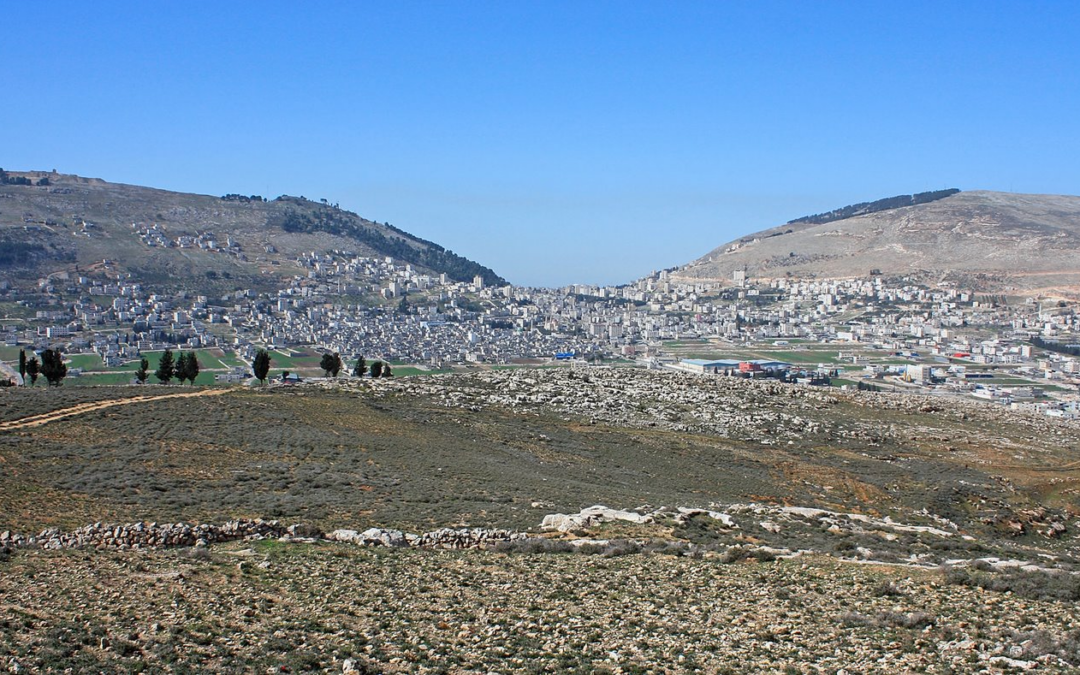Deuteronomy 27:2-5 KJV “And it shall be on the day when ye shall pass over Jordan unto the land which the LORD thy God giveth thee, that thou shalt set thee up great stones, and plaster them with plaster: And thou shalt write upon them all the words of this law … in mount Ebal … And there shalt thou build an altar unto the LORD thy God…”
Deuteronomy 27:2-5 NASB “So it shall be on the day when you cross the Jordan to the land which the LORD your God gives you, that you shall set up for yourself large stones and coat them with lime and write on them all the words of this law … on Mount Ebal … you shall build there an altar to the LORD your God…”
The Statutes
Deuteronomy 27 details the instructions that Moses gave to the elders of Israel. They pertain to an activity they were to engage in when they entered the land. It entailed setting up great stones upon Mt Ebal (on the right above) writing upon those stones the law of God, and erecting it as a memorial. Linked with this were the seemingly strange instructions that six of the tribes were to stand on Mt Gerizim (on the left above) to bless the people and six tribes to stand on Mt Ebal to curse the people if they dishonoured the law.
The statutes were written on Mt Ebal because the law brings with it a curse to those who fail to live by its standard. (Gal 3:10)
The Stones
The law was originally written on tables of stone and preserved in the ark beneath the mercy seat. Now, they are to be written on “great” stones, hard and cold. The greatness of the stones would remind the Israelites of the importance of the law — the stones of its inflexible nature. “Do them or die” was the message of the law.
They stood at the entrance to the land as a stark reminder that obedience would preserve them in the land while disobedience would lead to the land “vomiting them out” (Lev 20:22).
The Standard
The people of Canaan lived lives of immorality and wickedness. God was employing the nation of Israel as His sword. His patience and longsuffering had given them time to repent, but they had adamantly refused. Now Israel, poised to enter the land, was reminded of a totally different standard that was to control their behaviour and life in the land. They were to be a righteous nation. The law, engraved in stone within the ark and the law written on plastered stones on Mt Ebal, stood as a reminder of God’s standard for righteous living.
The Sacrifice
Mt Gerizim was the mount from which the six tribes proclaimed blessing upon the nation. Mt Ebal, the mount where the stones with the law was written, was marked by cursing. Where would God place the altar for the sacrifices? It was on Mt Ebal. The law brought with it a curse (Gal 3:10). The altar was needed for a sinning people.
The Apostle Paul was dealing with the introduction of wrong doctrine into the assemblies in Galatia. False teachers were introducing the teaching that the observation of the law was needed for salvation and for spiritual growth. Paul rightly argues that to put yourself under the law was to place yourself under its curse.

He interjects the altar, the cross of Christ, where men introduced the law and its curse. “Christ hath redeemed us from the curse of the law” (Gal 3:13). This was only possible because He became a curse for us. He endured the curse that a broken law demanded. Just as on Mt Ebal, there was an altar, so in Galatians 3, there is an altar. Just as that altar was for burnt offerings and peace offerings (Deut 27:6, 7), in like manner, the cross has brought us into a relationship with God as sons, enjoying the intimacy and blessings of sonship (Gal 4:4-7). Wherever there is law, grace does “much more abound!”
Read Noel Burden’s Personal Testimony – “Jesus Loves Me, This I Know”
Consider
It is worth reading the fulfillment of Moses’ instructions, which were carried out as recorded in Joshua 8 by Joshua and the children of Israel.

